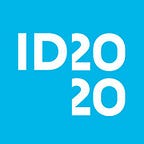ID2020 Welcomes Learning Economy Foundation as Newest Alliance Partner
We are delighted to announce today that the Learning Economy Foundation has joined the ID2020 Alliance.
The Learning Economy Foundation envisions a world in which learners can map their educational progress to achieve their academic, employment, and life goals.
A U.S. based non-profit organization with a global mission, Learning Economy is accelerating progress toward 21st-century education, addressing inequity in the workplace, and connecting a fragmented ecosystem of stakeholders into a unified hub of innovation — the Internet of Education
They do this by fostering collaboration among a diverse array of stakeholders through regional “labs”, which offer a unified ecosystem for innovation, pilots, research, and collaboration for the future of education and work. Learning Economy is currently running labs in the Asia Pacific region; Broward County, Florida; Colorado; and beyond.
“Education and workforce development represent an exciting opportunity to apply digital ID technology, especially as we think about the potential of digitally verifiable educational credentials,” said ID2020 head of advocacy and communication, Ethan Veneklasen. “We look forward to learning more about the Learning Economy Foundation’s innovative collaboration model and to working together to promote the ethical development and implementation of digital ID technologies in this evolving space.”
Learning Economy was launched at the United Nations General Assembly in September 2018 by founders Chris Purifoy and Jackson Smith. In addition to a staff of 18, the Foundation has engaged more than 50 steering committee members and advisors and hundreds of private-public stewards who share their commitment to modernizing the world’s education and employment infrastructure through the thoughtful implementation of emerging digital technologies — including digital ID.
“Digital identity plays a key role in reshaping the education and employment landscape,” said Chris Purifoy, Chairman of Learning Economy Foundation. “By shifting to a learner and employee-centered approach, we can begin solving some of the toughest challenges in education. New open standards and technologies can allow learners to own their own data and carry their credentials with them like assets throughout their entire lives. We believe our alliance with ID2020 will be an important catalyst toward enabling a more equitable, self-sovereign future.”
About ID2020
ID2020 is a global public-private partnership that harnesses the collective power of nonprofits, corporations, and governments to promote the adoption and ethical implementation of user-managed, privacy-protecting, and portable digital identity solutions.
By developing and applying rigorous technical standards to certify identity solutions, providing advisory services and implementing programs, and advocating for the ethical implantation of digital ID, ID2020 is strengthening social and economic development globally. Alliance partners are committed to a future in which all of the world’s seven billion people can fully exercise their basic human rights and reap the benefits of economic empowerment and to protecting user privacy and ensuring that data is not commoditized.
About LEF
Learning Economy Foundation (LEF), a 501c3 non-profit, serves as a thought leader in
ecosystem-first approaches to education and workforce infrastructure. With years of experience building relationships within standards bodies, education institutions, and the private-public sector, LEF supports local/regional Co-Labs as onramps to the Internet of Education (IoE).
LEF Co-Labs act as collaborative, localized research and development hubs for piloting foundational IoE utilities. Co-Labs help to unify the education to the employment supply chain by connecting systems into a fully unified but decentralized ecosystem. Co-Labs are guided with research to ensure informed, data-driven decisions; they are co-directed with local stakeholders to build community, align incentives, and establish shared systems of trust; they enable foundational pilots helping to confirm minimum system requirements, validate outputs, ensure interoperability, and refine and grow the local Co-Lab model; lastly, they act to support open, community-strengthening utility marketplaces, advance ongoing open source innovation, and ensure community and pilot sustainability.
